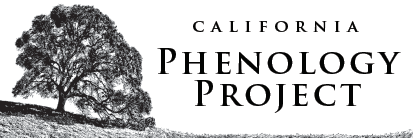These nine seminar modules cut right to the heart of phenological and climate change research. Aimed at an audience of undergraduate/graduate students in biological and environmental sciences, each module includes an introduction to the topic, a brief summary of the peer-reviewed articles that are included, questions to generate discussion, and suggestions for extended learning activities. Be sure to browse our annotated lectures for complementary materials.
Overview of all seminar modules (115KB)
A brief introduction & complete list of module topics & references
Seminar Module 1 -- Synthetic Studies Of Phenology: Reviews And Meta‐Analyses (1.4MB)
An excellent entry point into the field of phenological research and its many contributions to climate change research.
Seminar Module 2 -- Back to the Future: Use of Historical Records in Phenological Research (725KB)
From Thoreau’s journals to modern data sheets, this module explores how journal entries, preserved plants, and photographs have been used to detect phenological changes over the past 150 years.
Seminar Module 3 -- Plant‐Climate Interactions (2.3MB)
This module explores the adaptive significance of plant phenological responses to climatic conditions, over the short-term (one growing season) and over the long-term (two decades).
Seminar Module 4 -- Animal‐Climate Interactions (1.2MB)
This module explores current research on mammalian and avian phenological responses to climatic conditions, and how population demographic patterns are shaped by those responses.
Seminar Module 5 -- Phenological Mismatches in Marine and Terrestrial Systems (1MB)
A large and growing body of research indicates that different species’ phenological schedules respond differently to climate change. This module incorporates examples from marine and terrestrial ecosystems to explore the cascading effects of phenological shifts within ecological communities.
Seminar Module 6 -- Phenological Responses To Climate Change I: Adaptation and Evidence of Natural Selection on Phenological Traits (912KB)
This module explores whether new phenological strategies can evolve fast enough for plant and animal populations to keep pace with rapidly changing environments.
Seminar Module 7 -- Phenological Responses To Climate Change II: Demographic and Geographic Range Shifts (935KB)
This module explores how, for better or worse, phenological changes have allowed some plants and animals to disperse into new geographic regions.
Seminar Module 8 -- Phenological Responses to Climate Change III: Reproductive Changes (3.7MB)
Using a case study from the avian literature as a starting point, this module explores how phenological changes might affect the availability of mates during reproductive seasons and, therefore, the process of phenologically-mediated sexual selection. *This module is designed for seminar participants to conduct their own searches of the scientific literature in order to contribute to the discussion.
Seminar Module 9 -- Socio‐phenology: How Are Phenological Shifts Influencing Human Populations? (678KB)
Using articles on agriculture and allergens as a starting point, this module explores how climate change is influencing phenological processes that directly (and indirectly) affect the health and well-being of human populations. *This module is designed for seminar participants to conduct their own searches of the scientific literature in order to contribute to the discussion.





